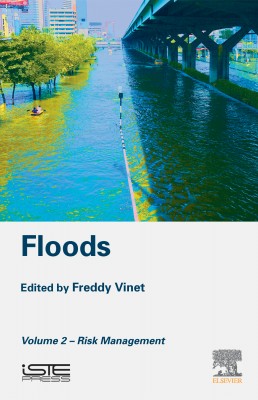
The management of flood risk seems to be facing a daunting paradox. Despite increasingly effective risk knowledge tools and the efforts of international institutions to place risk reduction at the top of the agenda, the cost of disasters continues to increase. It is also increasingly difficult to avoid the urbanization or development of potential flood zones.
The fundamental issue involves determining the conditions necessary for efficient prevention by focusing on adaptability to risk, which implies coping with the risk of flooding rather than directly fighting against it or simply ignoring it.
This second volume of the Floods series of books explores existing policies and tools which mitigate the impact of flooding: the construction of protective structures, the reduction of vulnerability, land use planning, the improvement of crisis management, etc. The closing chapters focus on the question of adaptation through post-flood reconstruction, integrating disaster risk reduction measures, e.g. through resilient urbanism.
Part 1. Strategic and Technical Aspects of Flood Prevention
1. Flood Management in France from 18th to 20th Centuries: A State Issue?
2. The French Flood Risk Management Model: Local Territories Facing State Omnipresency.
3. Management and Safety of Flood Defense Systems.
4. Coping Strategies in Dike Protected Areas.
5. Floods and Land Rights: From Risk Prevention Plans to Administrative Accountability and Penal Liability.
6. How Cost-Effective is Reducing the Vulnerability of Housing in Response to Flood Risk?
Part 2. Territories and Individuals at the Heart of Prevention
7. Does the Watershed Represent a Key Area within Flood Risk Knowledge and Management?
8. Sustainable Land Use Planning in Areas Exposed to Flooding: Some International Experiences.
9. Societal Choices in Flood Risk Management,?from Individual Responsibility to National Policy.
10. “Sustainable Flood Memories”: Developing Concept, Process and Practice in Flood Risk Management.
11. Integrating Anthropocentric Approaches into Flood Risk Management.
Part 3.Anticipating and Managing Flood Events
12. Characteristics of Flood Events.
13. Effectiveness of Institutional Alert Tools in Flood Forecasting in France.
14. From Public Involvement to Citizen-based?Initiatives: How Can Inhabitants Get Organized to Face Floods?
15. Crowdsourcing and Crisis-Mapping in the Event of Floods: Tools and Challenges.
16. Flood Crisis Management: The Operational Perspective
17. Local Crisis Management – The Communal Safety Plan: Challenges and Obstacles to Operationality.
18. Anticipating or Coping: Behaviors in the Face of Flash Floods.
Part 4. Post-disaster Recovery and Adaptation
19. Disaster Memories and Population Resilience.
20. Economic Resilience, Total Loss Control and Risk Transfer.
21. Economic Assessment of Flood Prevention Projects.
22. Flood Debris Management.
23. Post-Flood Recovery: An Opportunity for Disaster Risk Reduction?
24. Towards an Urban Design Adapted to Flood Risk?
Freddy Vinet is Professor of Geography at Paul Valéry University in Montpellier, France and co-director of the Gestion des catastrophes et des risques naturels Masters course. His research focuses on the vulnerability of populations faced with flooding and the evaluation of prevention measures.